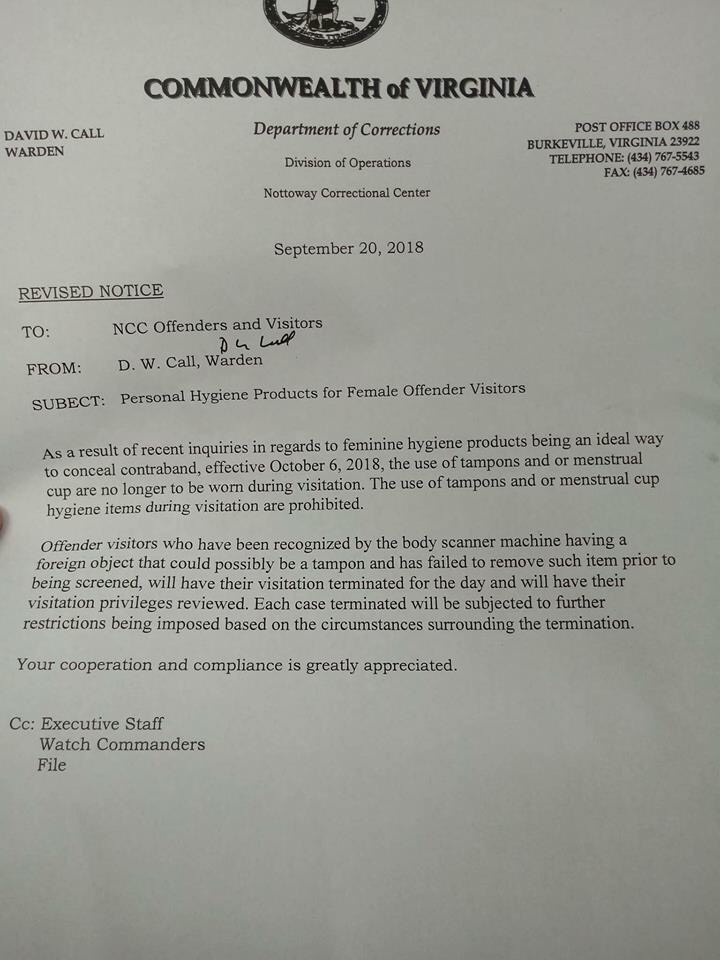UPDATE: After public outcry, the new policy has been suspended.
A new policy forbids visitors to Virginia prisons that are run by the Department of Corrections from using tampons or feminine hygiene cups. The letter articulating the policy states, in part:
As a result of recent inquiries in regards to feminine products being an ideal way to conceal contraband, effective October 6, 2018, the use of tampons or menstrual cups are no longer to be worn during visitation. The use of tampons and or menstrual cup hygiene items during visitation are prohibited.
Offender visitors who have been recognized by the body scanner machine having a foreign object that could possibly be a tampon and has failed to remove such item prior to being screened, will have their visitation terminated for the day and will have their visitation privileges reviewed.
Denny Maria, who took the photo of the letter shared here, told Truthout in a phone interview that the letter was handed to her and other visitors as they left Nottoway Correctional Center on September 22.

Maria, who visits her husband every weekend, calls the policy an attack on the dignity of women, and is concerned that young girls who are visiting their incarcerated parents will be subjected to it too.
“I can’t fathom how it’s OK,” she said. “It’s degrading. It’s humiliating.”
The Virginia Department of Corrections confirmed the authenticity of the letter and that this is a statewide policy. Director of Communications for the Virginia Department of Corrections Lisa E. Kinney stated via email:
In consultation with the Attorney General’s office, it was decided that facilities would offer pads to women who are wearing tampons while visiting a prison so the tampons don’t appear as possible contraband on a body scan. When potential contraband is seen on a body scan, visitors are offered the choice of a strip search or leaving the facility without visiting with an inmate. This policy aims to help visitors avoid that altogether.
The ACLU of Virginia condemned the policy.
“Helping people who are housed in jail or prison stay connected to friends, families, and communities is critical to rehabilitation and eventual, successful re-entry to society,” Bill Farrar, director of strategic communications for ACLU of Virginia told Truthout in an email. “Any policy that discourages visitors is, therefore, one that should be subject to the most exacting and careful review. In addition, a policy like this one that requires those who wish to visit people who are incarcerated to set aside their dignity and health is simply unacceptable.”
This is not the first time Maria has felt targeted because she is a woman. Two months ago, when her husband was housed in Lunenburg Correctional Center, she was wearing a menstrual pad when she went to visit him, according to Maria. She was forced to change her pad to a state-issued pad in front of two female guards before being permitted to visit, she said. The pad leaked, staining her pants.
Last year, CoreCivic (formerly Corrections Corporation of America) reportedly came to an agreement with two women who claimed they had to expose their genitals to prove they were menstruating when they visited South Central Correctional Facility in Tennessee.
Trump is silencing political dissent. We appeal for your support.
Progressive nonprofits are the latest target caught in Trump’s crosshairs. With the aim of eliminating political opposition, Trump and his sycophants are working to curb government funding, constrain private foundations, and even cut tax-exempt status from organizations he dislikes.
We’re concerned, because Truthout is not immune to such bad-faith attacks.
We can only resist Trump’s attacks by cultivating a strong base of support. The right-wing mediasphere is funded comfortably by billionaire owners and venture capitalist philanthropists. At Truthout, we have you.
Our fundraising campaign is over, but we fell a bit short and still need your help. Please take a meaningful action in the fight against authoritarianism: make a one-time or monthly donation to Truthout. If you have the means, please dig deep.
